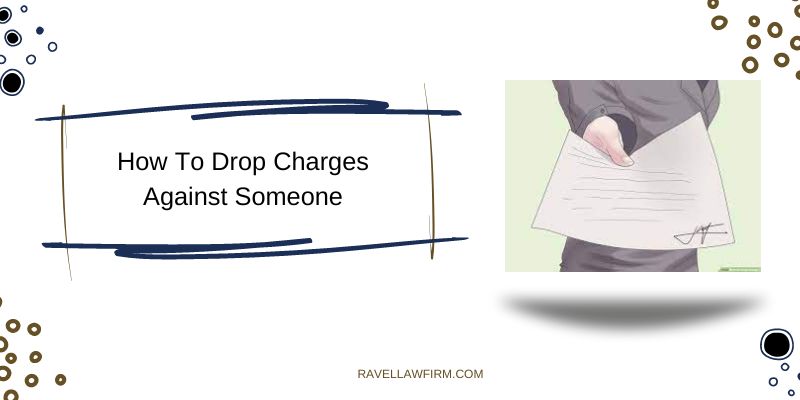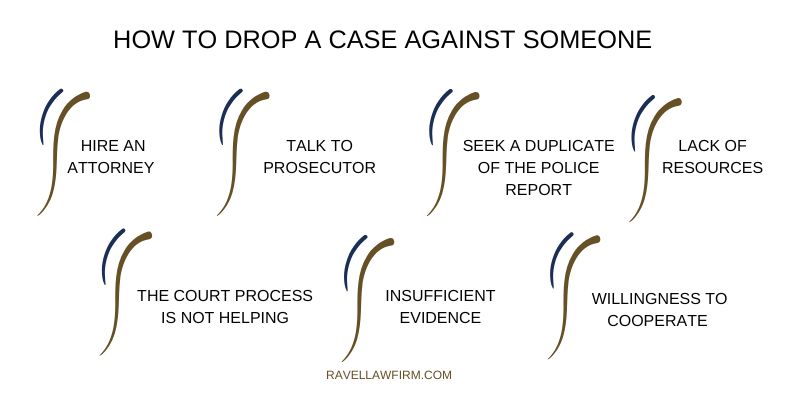One should remember that not all court prosecutions end up in court. True, many cases have their charges dropped before trial due to discussions between authorities and defense lawyers. You may be curious about How To Drop Charges Against Someone?
To drop charges against someone, you have to write reasons for dropping in an official Drop Charges Affidavit and take it to the police station. The District Attorney can decide when an accused criminal will face charges and what those charges will be. This state attorney can move forward with the case even if there are no more testimonies, but he probably won’t. Follow these steps to dismiss the allegations involving your friend or family member.

How to Drop a Case against Someone?
1. Hire An Attorney
Getting in touch with the attorney as soon as possible is crucial to help build the defense case. The testimony of witnesses may be crucial to the outcome of the case. Thus it is best if they provide it in writing. This could explain the misunderstanding that resulted in the detention.
It’s crucial to remember that the defense counsel in a lawsuit is working for the accused, not the complainant. Since the lawyer has an ethical obligation only toward the accused instead of the plaintiff, everything the jury thinks of the attorney could be used against them in court.
Please consider that it is against the law to provide false information to the police. As soon as possible is preferable when dismissing accusations. You may have to explain to the court why you’ve decided to withdraw the accusations.
2. Talk To Prosecutor
Those lawyers who work for the government and criminal file charges are called attorneys. No court or jury may “drop” accusations once they have been filed; only the prosecution has that authority. It’s unclear whether the state will comply with the alleged victim’s plea that charges be dropped. Suppose this person determines that the plaintiff was intimidated or coerced by the guilty. In that case, further felony proceedings may be issued against the suspect.
See Also: Federal Conspiracy Charges Sentences
3. Seek a Duplicate of the Police Report
Get a police report to ensure you have all the information you need about the incident. This is your legal entitlement as a named plaintiff or defendant in the case. A cost could be incurred for publishing or duplicating. When read attentively, the police statement can serve as a solid foundation for your case.
4. The court process is not helping
There will be multiple hearings after the court session starts, and the prosecutors may attempt to impose specific conditions on the litigants. This can be challenging if the litigant and the defendant are related. Some people might rethink filing a lawsuit as a result.
Misidentification is yet another common excuse for dropping the case. The longer the trial, the more time everyone involved must think. There may be a lack of firm proof, or the testimonies of the eyewitnesses need to be more consistent. A defendant has the option to dismiss all charges at any moment. That’s your privilege, by the way.
5. Insufficient evidence
The attorney may dismiss the charges when there isn’t enough evidence to convict someone of a crime. The judge’s decision against the accused may be weakened by discovering new proof. When the prosecuting attorney and prosecutors initially evaluate the court records, your lawyer may be able to intervene. He could claim that they lack evidence to file charges filed against you. Our lawyer will seek to dismiss the case if charges are brought despite insufficient evidence.
6. Lack of resources
The truth is that most district attorneys and prosecutors have more cases than they can effectively handle. As a result, authorities may have to prioritize some cases above others, dismissing or not even investigating less severe offenses. This is more probable to occur if you’ve never been arrested before and have been charged with minor offenses.
7. Willingness to cooperate
Your counsel may be able to negotiate a lesser sentence. A dismissal of charges if prosecutors determine that you are cooperative and willing to assist in the investigation or prosecution of additional offenses.

You May Also Like To Check: How To Press Charges For False CPS Report?
How to know If Charges Against Someone were Dropped?
It takes knowledge of the criminal justice system to learn if charges have been dropped. Because the prosecution has the option of dropping felony cases after they have passed a preliminary hearing, because the court determined not to indict or because the defendant filed a petition to dismiss the attorney.
Ask prosecutor
You can check if charges were dismissed by contacting the prosecutors or legal department of the courtroom where the case was first filed. Even though this is public knowledge, a knowledgeable attorney who deals with these people regularly will make the dialogue go more smoothly and fast.
Call the authorities
It’s also not a good idea to phone the officials looking to prosecute you directly if you are still determining if your accusations have been withdrawn. You may accidentally say something that could be used against you. In light of this, for your peace of mind, you should have your attorney verify whether allegations against you have been withdrawn.
FAQ’s
How frequently are Criminal Charges Dismissed?
There is no one explanation for why charges are dropped, although dropping ranges from the dismissal of all charges (which is relatively rare) to the dismissal of some charges from a vast list (which is more typical). The main point to remember is that there is a wide variety of reasons charges could be dropped at any point in a criminal issue.
Is it possible to Restore Dismissed Charges?
The prosecutor can refile dismissed charges via one of two methods. There is the option of a “with loss” or “without loss” dismissal of charges. When charges are dropped “with prejudice,” they can never be brought up again. But if the charges are dropped “without prejudice,” they can be refiled later. The only way for the same offense to be brought up again after being dropped without prejudice is if new evidence emerges that wasn’t available when the initial charges were filed.

Hi, I’m Brian Gary; I have my Doctor of Juridical Science (SJD) degree from SMU Dedman School of Law in Dallas. Over the years, I have dealt with many families and successful corporate Legal cases. I have counseled many people on legal matters, and along with my profession, I write about Law on my blog. Please feel free to contact me for counseling/case discussion; I’ll be happy to help you.